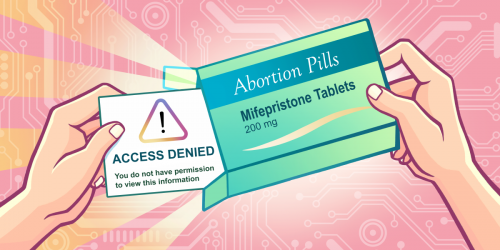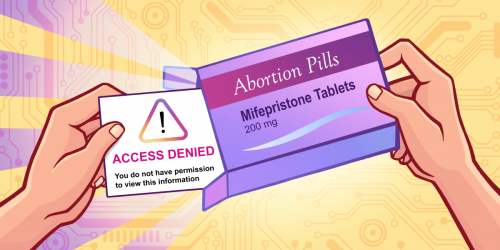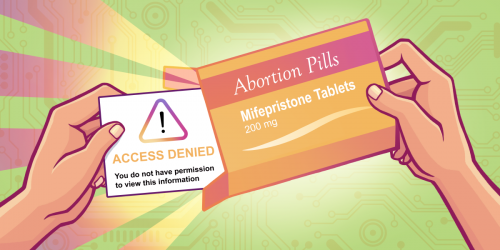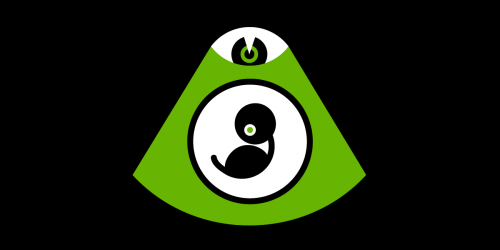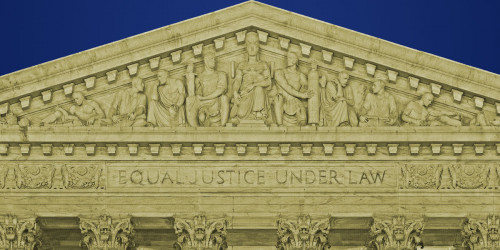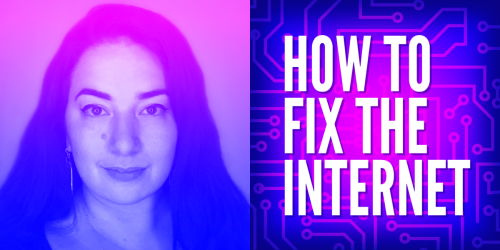BY KENYATTA THOMAS | September 22, 2025
This is the fourth installment in a blog series documenting EFF's findings from the Stop Censoring Abortion campaign. You can read additional posts here.
One of the goals of our Stop Censoring Abortion campaign was to put names, stories, and numbers to the experiences we’d been hearing about: people and organizations having their abortion-related content – or entire accounts – removed or suppressed on social media. In reviewing survey submissions, we found that multiple users reported experiencing shadowbanning. Shadowbanning (or “deranking”) is widely experienced and reported by content creators across various social media platforms, and it’s a phenomenon that those who create content about abortion and sexual and reproductive health know all too well.
Shadowbanning is the often silent suppression of certain types of content or creators in your social media feeds. It’s not something that a U.S-based creator is notified about, but rather something they simply find out when their posts stop getting the same level of engagement that they’re used to, or when people are unable to easily find their account using the platform’s search function. Essentially, it is when a platform or its algorithm decides that other users should see less of a creator or specific topic. Many platforms deny that shadowbanning exists; they will often blame reduced reach of posts on ‘bugs’ in the algorithm. At the same time, companies like Meta have admitted that content is ranked, but much about how this ranking system works remains unknown. Meta says that there are five content categories that while allowed on its platforms, “may not be eligible for recommendation.” Content discussing abortion pills may fall under the umbrella of “Content that promotes the use of certain regulated products,” but posts that simply affirm abortion as a valid reproductive decision or are of storytellers sharing their experiences don’t match any of the criteria that would make it unable to be recommended by Meta.
Whether a creator relies on a platform for income or uses it to educate the public, shadowbanning can be devastating for the growth of an account. And this practice often seems to disproportionately affect people who are talking about ‘taboo’ topics like sex, abortion, and LGBTQ+ identities, such as Kim Adamski, a sexual health educator who shared her story with our Stop Censoring Abortion project. As you can see in the images below, Kim’s Instagram account does not show up as a suggestion when being searched, and can only be found after typing in the full username.

Screenshots provided to EFF from M+A Hotline
Earlier this year, the Center for Intimacy Justice shared their report, "The Digital Gag: Suppression of Sexual and Reproductive Health on Meta, TikTok, Amazon, and Google", which found that of the 159 nonprofits, content creators, sex educators, and businesses surveyed, 63% had content removed on Meta platforms and 55% had content removed on TikTok. This suppression is happening at the same time as platforms continue to allow and elevate videos of violence and gore and extremist hateful content. This pattern is troubling and is only becoming more prevalent as people turn to social media to find the information they need to make decisions about their health.
Reproductive rights and sex education have been under attack across the U.S. for decades. Since the Dobbs v. Jackson decision in 2022, 20 states have banned or limited access to abortion. Meanwhile, 16 states don’t require sex education in public schools to be medically accurate, 19 states have laws that stigmatize LGBTQ+ identities in their sex education curricula, and 17 states specifically stigmatize abortion in their sex education curricula.
In a world that is constantly finding ways to legislate away bodily autonomy and hide queer identities, social media platforms have an opportunity to stand as safe havens for access to community and knowledge.
Online platforms are critical lifelines for people seeking possibly life-saving information about their sexual and reproductive health. We know that when people are unable to find or access the information they need within their communities, they will turn to the internet and social media. This is especially important for abortion-seekers and trans youth living in states where healthcare is being criminalized.
In a world that is constantly finding ways to legislate away bodily autonomy and hide queer identities, social media platforms have an opportunity to stand as safe havens for access to community and knowledge. Limiting access to this information by suppressing the people and organizations who are providing it is an attack on free expression and a profound threat to freedom of information—principles that these platforms claim to uphold. Now more than ever, we must continue to push back against censorship of sexual and reproductive health information so that the internet can still be a place where all voices are heard and where all can learn.
This is the fourth post in our blog series documenting the findings from our Stop Censoring Abortion campaign. Read more in the series: https://www.eff.org/pages/stop-censoring-abortion




